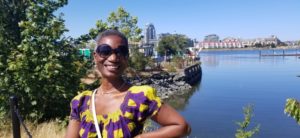When Silvia Mangue—who grew up in Spain but was born in Equatorial Guinea, in West Central Africa—arrived in Victoria in 2005, she decided that staying at home to raise her son was the best idea at the time. However, once a few years had passed, she made her way to Camosun.
“I was very lucky at that time to be a stay-at-home mom, but, in 2010, I decided it was time for me to go back to school myself, so I started school at Camosun College, and the rest is history,” says Mangue.
When Mangue was finishing her studies—a bachelor of Business Administration in Human Resource Management and Leadership that she completed in 2016—she was having trouble finding work, so she took matters into her own hands.

“I decided to start my own organization, “says Mangue. “I saw the immigrant woman, and I thought, they come here, they bring so much knowledge and experience, but they cannot use it, so what kind of job can they do here in Canada that is meaningful and important, where they can make money doing it?”
Mangue started a business that helped elderly immigrants through companionship and helping to perform tasks.
“I did that for a while, five years, and then the city offered me a job that I couldn’t refuse,” she says. “So, I had to close the business. But in parallel with what I got and lost, I created Kulea Culture Society. Kulea Culture Society is a society to promote equity, diversity, and inclusion in the community through events and programs.”
The Road to Becoming a Canadian Citizen and Race and Discrimination are two of the programs at Kulea Culture Society.
“With the Road to Becoming a Canadian Citizen program, I was very interested in doing a presentation for people who have been here for generations,” says Mangue. “They often have a notion that immigrants get perks, that it’s easy to come into the country. It’s not true; it’s extremely hard. And they think that because they don’t know.”
Mangue says that people spend years in refugee camps waiting to enter Canada.
“When we get here our education is only good enough to get us into the country,” says Mangue. “The more educated you are, the more promise you have of getting into the country. And you have to be 100-percent healthy. If you have one illness, it will be a burden on the social service in Canada.”
She points out that it can be difficult depending on age, as well.
“Depending on how old you are, if you’re 40, do you want to go to school to become a dentist all over again because that’s what you did before? Where is the money for that? You have to start working as soon as possible so your children can go to university because it won’t be possible for you,” she says.
Mangue created the workshop to help Canadian residents get a better understanding of how the process actually works.
“I created this workshop to let long-term residents know that immigrants don’t get any perks,” she says. “They do everything from scratch. And that is why you find a lot of taxi drivers who were doctors or engineers in their countries, and they come here and not only have to start all over, but in another language. It is a huge barrier.”
Mangue says that Camosun was great for getting support in such difficult areas.
“Camosun was a really good environment to get that support,” she says. “The teachers were really helpful in advising, in giving extra time for assignments if needed, because they understood.”
The newest program Mangue has started incorporates cooking with the Kulea Culture Society.
“Kitchen and Culture is a program that brings together local chefs,” she says. “I call them local chefs because I want to give them that elevation, these are people that love to cook for their families, their friends, for everyone… The difference with this cooking program to others is people can come in and share their migration stories to Canada. It’s a way of building bridges, building relationships, it’s a way of fighting racism and prejudice, it’s a way of eating together, so it’s really a way of building community, because people can be really lonely out there.”
It’s not her only experience leading a community-minded group: Mangue began volunteering with the B.C Black History Awareness Society in 2013 and ended up helping guide that organization as well.
“I really loved what they did, which was educate people about black pioneers in B.C.” she says. “A lot of people don’t know that black pioneers existed here, and that they left a very big and very rich legacy here in Victoria. So, I began with volunteering with them, and then I became a board member, and then I became president.”
